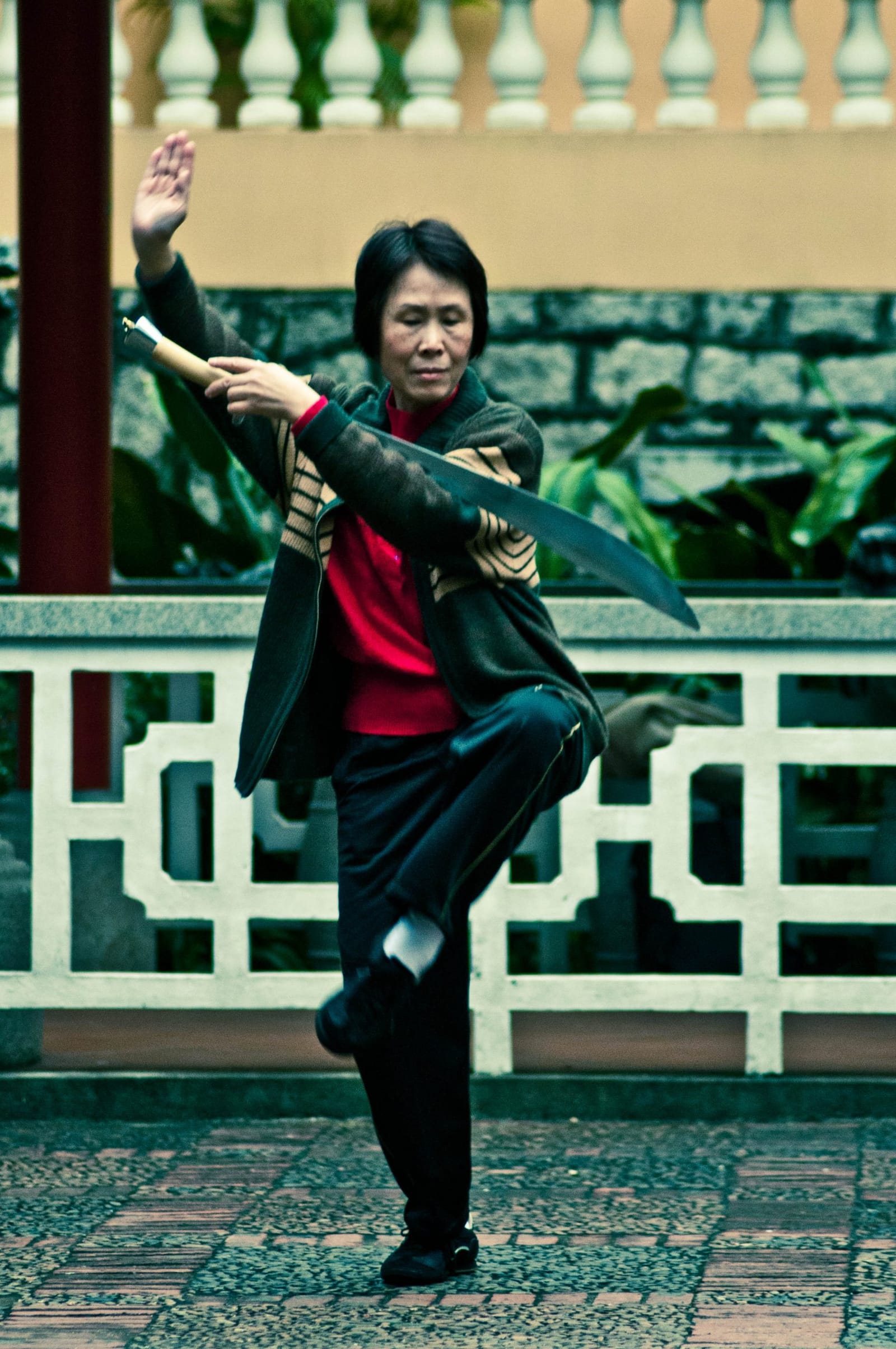Guest post by Stephanie Chin Whitesel. (Thanks Steph!)


The tai chi master Yang Chengfu who died in 1936
No, this doesn’t mean that I can break cinderblocks in half with my bare hands or catch flies with chopsticks. As much as I would love to have the strength and ability to perform these tasks, I know that deep down inside I’m a klutzy weakling. Tai chi is the perfect type of exercise for me, a slow and controlled form of martial arts often practiced by the Chinese in parks. No lifting weights, no extensive running. Nothing like any of the gym classes that I had to endure during high school.
My education took place in Hong Kong, the city I fell in love with on my first trip through China. It’s a place where thousands of neon signs add to the buzz and energy of the streets that seven million people roam each night. A metropolis that makes me feel safer than New York City ever will. The shopper’s mecca where you can get dollar deals or designer ensembles. The city and its history represent me: a Chinese culture heavily influenced by western ideas.

Hong Kong: a Chinese culture heavily influenced by western ideas
Four years after the beginning of my infatuation with Hong Kong, I had the opportunity to return to the city for a few days. I discovered that Kowloon Park was a ten minute walk away from where I was staying, right in the heart of the city. So, a friend and I arranged to wake up the following morning and arrive at the park in time to practice tai chi with the locals.
Easier said than done. Smacking my alarm clock to stop its intrusive beeping, I forced my eyes open and realized I had gotten up earlier than the Sun. Ugh. My fluffy, white pillow started making a pretty convincing case to simply lie back down again to rest my eyes. Knowing that I had fallen into that trap many times before, I tossed aside the bed covers and put on shorts, an old post-prom t-shirt, and a battered pair of sneakers. Knocking on my friend’s door, I soon realized that her pillow was comfier than mine. She wasn’t awake.
So, I set off on my own, along with my trusty camera, suddenly unsure of how to proceed. I didn’t want to make a fool of myself by being the only inexperienced person out there. Passing a pond blanketed with large green lily pads, I climbed a set of worn stairs into a clearing dotted with large sculptures. In the surrounding trees the birds were arguing over who had the most melodious song. In the clearing in front of me, people were practicing tai chi.
Except, it wasn’t how I pictured it. I had imagined a mass of people going through the same slow, sure motions together. Instead, people were scattered throughout the area practicing routines individually. How was I supposed to join one of them? I was just expecting to join a large group. This was no good at all.
Pondering my situation, I decided to take out my camera and take some shots of the art form being performed. My attention was soon drawn to a man clad in a loose fitting black outfit. He couldn’t have been more than five feet tall. As evidenced by his movements, he was physically fit and I was having trouble guessing his age. His skin was a rich tan color with just the right amount of wrinkles to give him some character. His face was set with a solemn look of determination. He was doing a routine that utilized a long bamboo pole.
Next, he brought out a sword and practiced a lengthy and impressive looking routine. Each motion was precise and elegant. In this particular exercise there was a considerable amount of complex foot shifting and hand turning. His movements were confident and steady. I never once saw the sword’s tip waiver in a moment of weakness. His poise and balance were impressive and he exhibited the grace that I associate with classical dance. After he finished, I asked for his permission to take a photo. It just didn’t seem like a good idea to annoy a man with a threatening looking sword. Fortunately, he grinned, nodded, and immediately went into another series of moves.
After snapping some shots, I just sat there watching him, in awe of his agility despite his age. Bending, stretching, and balancing carefully, he continued in a series of fluid motions. I doubted that many elderly people in the States would be able to do the same actions. I eventually started talking to him and, despite his limited knowledge of English and my inability to speak any Chinese, I learned that his name was Wong Bei. A 76-year-old resident of Hong Kong, he had lived there his entire life. Each morning he rises early enough to get to the sculpture garden at 6:00am to begin his exercise. I was in the process of asking him another question when he suddenly started walking to the middle of the clearing and motioned for me to follow. Dropping my camera next to his pile of martial arts equipment, I eagerly did as instructed.
Standing about five feet in front of me, he told me to mirror everything he did. After a few moments, I was fully aware that I was getting stares from onlookers, so I tried to concentrate more on getting the positions just right. Wong Bei made the moves seem effortless. Meanwhile, I was breaking into a sweat. Upon completing the warm-up, Wong Bei said, ‘Just one more.’ I tried to shrug off the disappointment over the brevity of my lesson, but I soon discovered that this was just the first of many ‘Just one more.’
After nearly an hour of personal lesson time, other students began to arrive. At 7:30am each morning, Wong Bei has about a dozen students who come to learn tai chi from him. Many of them were middle aged and spoke English. The students had been studying with Wong Bei for anywhere from a few months to many years. No matter the case, each called him Master. Sadly, I had arranged to be somewhere at 7:45am, so I had to make my excuses and leave. I explained my situation to one of the students who had arrived and he kindly acted as translator for the next several moments.
Wong Bei asked my name and I wrote it down in English along with my address because he wanted to send me a tai chi DVD to continue my studies in America. He peered at my name. ‘Chin? Your last name is Chin?’ I nodded and he asked me which one, for apparently there are numerous families of Chins. Not knowing the answer, I shrugged and he asked me to print out the name in Chinese. Fortunately, I knew how to do so. Or, at least, I thought I did. For when I finished, he gave me one of his smiles, uttered an understanding grunt, then gently took the pen from me and added a pen stroke to one of my characters. Oops. I looked up and Wong Bei still peered at me with his kind, grandfatherly smile.

Tai Chi Chuan
I turned to my translator, ‘Please tell him thank you for taking the time to teach me today.’
‘Master Wong Bei says it was his pleasure, you were a good student. Did you enjoy yourself?’
‘Oh! Of course! I learned so much this morning.’
‘Are you coming back tomorrow?’
‘Absolutely.’
Top photo: Wikimedia Commons

